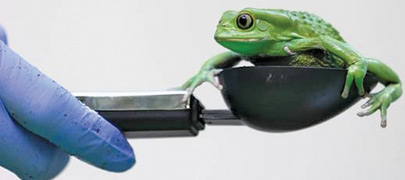Burrowing frogs' genes could help humanity voyage into space
The ability of Cyclorana alboguttata (not pictured) to survive
hibernation intact could preserve astronauts' muscles during journeys in
micro-gravity
The genetic secrets of a species of frog that hibernates for months
could hold the key to safer space voyages, say scientists.
|

A waxy monkey tree frog - not a burrowing frog - is weighed. |
Researchers say that ability of the burrowing frog species Cyclorana
alboguttata to maintain muscle mass while dormant could help overcome
the problem of astronaut's own muscles deteriorating during long trips
in zero gravity.
Although floating weightless in space is something many would-be
astronauts dream of, this unique environment takes its toll - leaving
muscles drastically under-used and causing a number of health problems
from tendonitis to fat accumulation. With a manned mission to Mars
taking anywhere between 39 and 289 days depending on how close the
planet is, astronauts would certainly benefit from anything that ensured
they were in top physical condition upon arrival on the planet's
surface.
Scientists studying the frog say that one of its genes known as 'survivin'
could help. When faced with droughts in their native Australia, the frog
survives by burrowing underground and covering itself with a cocoon of
shed skin. This keeps them relatively insulated from harm - but the
survivin gene is necessary to protect them from their own bodies.
Cells have many different 'suicide mechanisms' but one in particular
kicks in to remove matter that is apparently damaged - something it
judges by long periods of inactivity. Survivin stops this from
happening.
"If we can understand the cell signalling pathways that confer
resistance to muscle wasting, then these could be useful candidates to
study in mammalian muscle atrophy," said PhD student Beau Reilly. "These
could help to develop therapies to treat bedridden human patients or
even astronauts, who frequently lose muscle tone when exposed to
reduced-gravity conditions."
This sort of research could be even more important for journeys into
space further afield than Mars. If scientists can't develop faster
propulsion technology in the future then even travelling to nearby stars
could take tens of thousands of years.
"I am fascinated in animals that survive in extreme conditions" said
Reilly. "I think humans and modern medicine could learn a great deal
from organisms such as burrowing frogs".
- The Independent
|

